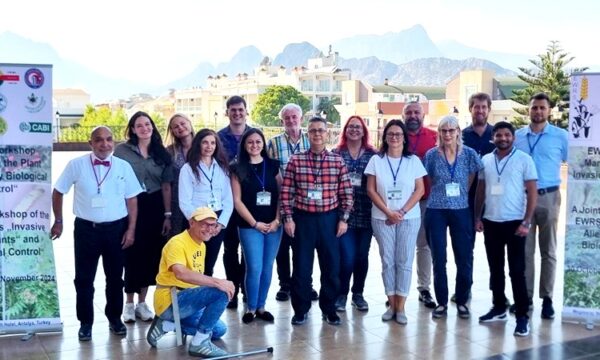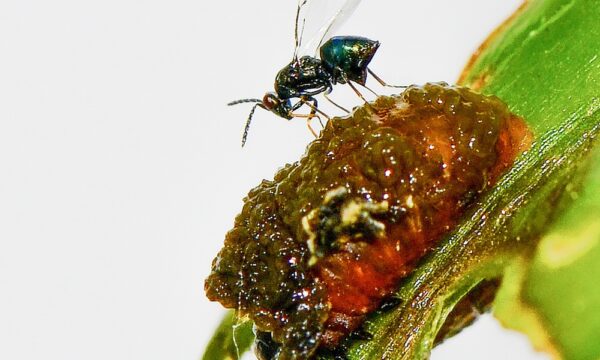CABI has worked on invasive species for over 100 years, developing practical ways of tackling the biggest threats. Our scientists are world leaders in biocontrol research – an approach that uses invasive species’ natural enemies, like insects and fungi, to control their spread.

In this blog, Dr Dick Shaw, CABI’s Senior Regional Director for Europe & The Americas, discusses his career at CABI, which spans almost 30 years. Dick is an applied entomologist by training and is based in CABI’s Egham laboratories. His research has led him to carry out extensive overseas survey work during his career.
Dick joined CABI as a Research Assistant in the 90s by chance, due to his friend offering him his role at CABI (and his flat!). Since, Dick has worked his way through the ranks at CABI, where he has enjoyed a range of successes and witnessed the prominence of invasive species and biocontrol develop over time.
Here we learn a little more about Dr Dick Shaw.
What motivated you to work in the field of biocontrol and invasive species?
I have always had an interest in science and the workings of things since a young age. My mind has always been very direct, and I often wouldn’t engage with something I couldn’t see, witness or test. This is why science has always been appealing to me. I enjoy the logic behind it. In particular, the beauty of planning an experiment and drawing conclusions from the results has always fascinated me. Although I was never really interested in insects growing up, I liked the areas of biodiversity and nature, and this interest helped me to where I am today.
How did you end up joining CABI and building a career of over 25 years?
I have always had a considerable interest in seeing the world. I left school to work on summer camps in America for 2 years as a counsellor, which sparked my passion to travel.
Then, I completed a BSc (Hons) in Zoology at University College London, UK, in 1991. This further fuelled my interest in nature and biodiversity. After I received my degree, I had various careers before eventually taking over my friend’s position at CABI as a Temporary Research Assistant.
As I became more established at CABI, my interests in the field grew. Eventually, I got into the insects and biocontrol side of things, working on weeds from the UK that became invasive in New Zealand and Australia, like gorse (Ulex europaeus), broom (Cystisus scoparius) and heather (Calluna vulgaris). The role I had in the weeds team was an absolute pleasure, and I learnt a lot from Dr Harry Evans; I found a real home at CABI as everyone worked in a tightly knit team. There is a level playing field at CABI, which allowed me to progress my research and work through collaborating with others.
In 1996, I completed a part-time MSc in Applied Biology at Birkbeck College, University of London, UK, which was beneficial to my role at CABI at the time. I then began to climb the ladder, as they say, over the next 20 years or so.
What motivated you to work in the areas of invasive species and biological control?
What really motivated me to work in this field is the chance of discovering something no one else knows or working with a species nobody else is; it’s thrilling. Moreover, you’re always working on or learning something new. This keeps me on my toes and engaged!
If the research, you do ends up applied in the field and is successful you can truly achieve impact at a regional and/ or geographical scale. Yes, it takes time with the many projects we work on at CABI, but when the results emerge, they are particularly astounding and remarkable to witness.
How has CABI helped to develop your career further?
CABI has provided me the time to do my MSc and PhD, as well as projects around which I could build them. My PhD looked at ‘Classical Biological Control of Weeds in Europe’ and was completed part-time over nine years, a timescale no longer available to most.
There has also been various training I’ve received, which has helped me in my new roles in the company. CABI has always supported my career and many of my colleagues. The most valuable training I ever received was from learning on the job from people around me.
Overseas fieldwork with Dr Harry Evans and Dr Matthew Cock, who are leaders in their field, taught me an extraordinary amount about good science as well as good people. It also generated endless stories which I share whenever I get a chance.
However, there have been times I’ve taken on a research project that didn’t provide the results I wanted, like Japanese Knotweed. I started working on the research project in 2000, and now, in 2023, it’s still not working, which is infuriating.
We’ve done a vast amount of research, published lots of papers and made fantastic connections around the world and enchanted the media. We’ve even advanced the science, but biocontrol of Japanese Knotweed remains beyond our reach. This is the world of science, I suppose!

How has the field of invasive species evolved over the past 25 years?
The number of invasive species arriving around the world has increased exponentially in recent years because of the 3 T’s; tourism, travel and trade. Luckily, we understand more about the tools we can use to control these invasive species. CABI has further built on its capabilities and services to aid countries worldwide.
We’ve always sent agents from Europe to places where invasive plants have become a problem. Europe is now benefitting from other agents coming back. CABI has achieved four of the five releases in the past fifteen years, and we are certainly leading Europe, which is an absolute triumph for CABI.
Biocontrol is a hard concept for people to understand and indeed trust so persuading people that you have their best interests at heart is a big part of the job. The amount of science that goes into the work impresses and reassures people.
The scale of invasives and their numbers are getting higher, which is concerning and CABI is adopting a multidisciplinary approach, ensuring policymakers, stakeholders and local researchers are engaged the whole process as early as possible.
How has biocontrol evolved in the public mind over the years?
It varies from country to country. In countries where biocontrol has occurred and been successful, people are much more knowledgeable and tolerant of the process. Areas of Europe that haven’t conducted biocontrol are relatively in the dark about the benefits and focussed on famous negative stories like the cane toad. You need to build up wins and publicise these wins so more people understand and welcome the approach.
Science doesn’t stand still. Technology has developed over the years, and the public interest has grown.
Can further research in your field be used to promote sustainable development across the globe?
Of course, it can. Research is ever-expanding in the field.
Invasive species can have a knock-on effect on several things in our ecosystems. Sometimes it is subtle but in other cases like rubber vine (Cryptostegia grandiflora) in Australia you can have complete ecosystems destroyed by an invasive weed threatening world heritage status. It can all be solved with one fungus. That’s the amazing thing about biocontrol.
More actors and policymakers need to understand the power of biocontrol. Yes, prevention is excellent for investment, and if you stop the species from arriving in the first place, you’ll never have a problem. But once it is beyond traditional management many forget that biocontrol can solve unimaginable scales of impact.
Are there future areas of research you wish to explore?
We can use molecular tools to enhance our work, and we will need increased social science involvement for effective outreach.
The trouble with weed biocontrol is that it could take decades to work. This, unfortunately, cannot be changed for the time being as you can’t rush Mother Nature. In the future, gene drive technology may be deployed against some invasive species but I would rather focus on nature-based solutions for now.
Thank you for taking the time to talk with us, Dick. Any last comments?
I am delighted to see that biocontrol and invasive species remain at the forefront of CABI’s work to this day, and I’m excited to see where future research takes us.
CABI has been an extremely supportive and flexible employer. Whenever I wanted to do a particular activity in the field or take my research in a particular direction, the doors were always open.
Find out more
Evaluating the mycoherbicide potential of a leaf-spot pathogen against Japanese knotweed
Could better awareness increase the uptake of weed biocontrol in Europe?
CABI hosts delegation of top UK scientists and CGIAR
Green Muscle provides strength against devastating locusts in the Horn of Africa
Related News & Blogs
Biological control in action: Zambia’s field days on fighting fall armyworm
Experts from CABI recently held two field days and an expo in Zambia, showcasing innovative approaches to pest management to 584 farmers, agro-dealers and other stakeholders to help raise awareness of approaches to tackle the invasive fall armyworm (Sp…
11 June 2025




